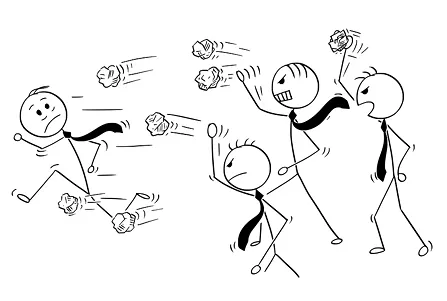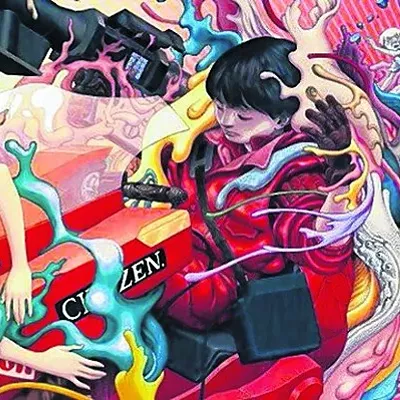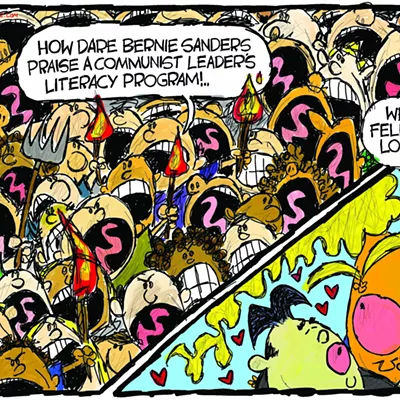Thursday, August 2, 2018
When Democrats Turned Tail, And Kept Running
In 1988, George H.W. Bush, Reagan's vice president, and Michael Dukakis, three term Massachusetts governor, ran for president. Bush was a moderate Republican who moved to the right when he became Reagan's running mate in 1980. Dukakis fit neatly into the New England liberal Democratic mold.
In 1987, during an interview with New York Magazine, Dukakis referred to himself as “a card-carrying member of the American Civil Liberties Union.” The "card-carrying member" phrase was Dukakis' attempt at wry humor. He was poking fun at people who thought he was a "scary liberal" by making an ironic reference to the "card-carrying communist" accusation used by Joe McCarthy during the Red Scare of the 1950s.
During the campaign, Bush bludgeoned Dukakis with the quote. "He calls himself a card carrying member of the ACLU," Bush repeated at every opportunity. When Dukakis tried to defend himself by talking about the good work the ACLU does protecting our constitutional rights, Bush replied, "You're the one who called yourself a card carrying member of the ACLU."
The ACLU attack was amplified by the Bush campaign's repeated assertion that Dukakis was "too liberal." The charge was leveled with such venom, "liberal" became a dirty word which Democrats have avoided ever since. It dropped out of the Democratic lexicon after Dukakis' defeat. Democrats floundered around until they hit on the word "progressive" as a replacement.
The final nail in Dukakis' political coffin, other than some self inflicted wounds, was the infamous Willie Horton ad. Horton, a black man, was released on furlough when Dukakis was governor, and he went on to commit rape and murder. The ad, with an image depicting Horton as the embodiment of evil, implied others like him would run rampant if Dukakis was elected president.
The Bush campaign's go-for-the-jugular attack style was the creation of Lee Atwater, Bush's campaign manager, and has continued to be used against Democrats with great success. It was taken up by Fox News founder Roger Ailes, who created the Willie Horton ad together with Atwater, Karl Rove, who began his political career around the same time as Atwater, and hoards of Atwater wannabes who have run Republican campaigns ever since.
After the Dukakis debacle, Democrats not only shied away from the word "liberal." They ran from issues which focused on social welfare or on blacks and other minority communities, for fear of the beating they would take from Republicans. Of course, the beatings continued.
During Clinton's 1992 presidential campaign, he inoculated himself against looking soft on crime and black people by taking time off from his campaign to return to Arkansas so he could oversee the execution of a black man, while asserting his strong support for capital punishment. He also condemned hip hop artist Sister Souljah for her lyrics and statements. When Clinton played his saxophone on the Arsenio Hall Show, he chose "Heartbreak Hotel." He may be Elvis, but he's not Little Richard or Chuck Berry. As president he signed the tough-on-crime "Three strikes and you're out" bill. Later, he signed legislation which, he bragged, "ended welfare as we know it." Clinton triangulated his way out of any number of potentially "liberal" positions and ended up being pilloried for his affair with Monica Lewinsky, not his policies.
Barack Obama did as much as a black candidate could do to neutralize racial issues during his 2008 presidential campaign, with reasonable success. He somehow weathered the charge that he was a secret Muslim born in Kenya, which persisted throughout his presidency. As a centrist Democrat on most issues, Obama wasn't likely to take many stances that leaned far to the left. But when he used the word "redistribution" in an off-the-cuff videotaped conversation during a campaign event, Republicans jumped on the term. That one reference to redistribution created Joe the Plumber, the iconic common man who Republicans claimed would be hurt by Obama's — a word was dragged back into the political arena for the first time in years — Obama's "socialist" policies. From that point forward, "socialist" became the label Republicans hung on any Democrat who dared advocate for programs aiding the poor or supported universal health care.
When Henry Louis Gates, a black Harvard professor, was arrested for "breaking in" to his own home during Obama's first year as president, Obama had to recalibrate his original statement about the incident which was critical of the police response. He held a congenial "beer summit" with Gates and the arresting officer on the White House grounds to prove he wasn't attacking the police, or defending a black man.
Republicans kept up a steady stream of vitriol against Obama, which he took in stride whenever possible, without responding in kind. He walked a fine line between advocating for the progressive parts of his agenda and compromising with the Republican-majority Congress. In his statements, he mostly following Michelle's adage, "When they go low, we go high." His approach didn't stop Republicans from going lower.
Here in Arizona, Democrats in the legislature voted against the anti-immigrant bill SB 1070 in 2010, but Democratic candidates were urged to avoid the issue as much as possible in their campaigns, except to say they stood firmly against illegal immigration. Their fear of taking a stand didn't help them in the election.
Since the devastating attacks on Dukakis in 1988, Democrats have been called liberals, socialists, immigrant lovers, degenerates, atheists — any epithet they can think of to hurl at their opponents — by Republicans whenever Democrats take strong stands on controversial issues. More often than not, Democrats cower and back down. When they try to dance around the issues to stay out of trouble, they're accused of not standing for anything. Given a choice, most Democrats have chosen to play it safe, sacrificing their message in a vain attempt to protect themselves from Republican attacks. Of course, the attacks continued.
It took an outsider, Bernie Sanders, to break through the "play it safe" barrier in 2016. He proudly called himself a Democratic Socialist. He advocated for Medicare for All and free college. He made the problem of income inequality his signature issue. Instead of hurting him, his positions turned him into a folk hero. Democrats learned it was possible to take strong stands on contentious issues and be applauded for their courage.
During the current campaign season, a growing number of candidates are following Bernie's lead and speaking their minds, then standing up to Republican assaults. Many of them have been successful in the primaries, to the Democratic establishment's surprise. We'll have to wait until November to see how they fare in the general election.
A major battle is raging inside the Democratic Party. Should candidates make strong statements which may alienate some of their potential supporters but energize other voters? Or should they make safe statements which don't offend anyone — except people who are furious at Democrats for running away from a fight and refuse to vote for no-message candidates? The battle won't be over any time soon.
A "What Happened to Lee Atwater?" Note: Lee Atwater died of brain cancer in 1991, at age 40. When he knew he was dying, he apologized for the tactics he used against Dukakis.
In 1987, during an interview with New York Magazine, Dukakis referred to himself as “a card-carrying member of the American Civil Liberties Union.” The "card-carrying member" phrase was Dukakis' attempt at wry humor. He was poking fun at people who thought he was a "scary liberal" by making an ironic reference to the "card-carrying communist" accusation used by Joe McCarthy during the Red Scare of the 1950s.
During the campaign, Bush bludgeoned Dukakis with the quote. "He calls himself a card carrying member of the ACLU," Bush repeated at every opportunity. When Dukakis tried to defend himself by talking about the good work the ACLU does protecting our constitutional rights, Bush replied, "You're the one who called yourself a card carrying member of the ACLU."
The ACLU attack was amplified by the Bush campaign's repeated assertion that Dukakis was "too liberal." The charge was leveled with such venom, "liberal" became a dirty word which Democrats have avoided ever since. It dropped out of the Democratic lexicon after Dukakis' defeat. Democrats floundered around until they hit on the word "progressive" as a replacement.
The final nail in Dukakis' political coffin, other than some self inflicted wounds, was the infamous Willie Horton ad. Horton, a black man, was released on furlough when Dukakis was governor, and he went on to commit rape and murder. The ad, with an image depicting Horton as the embodiment of evil, implied others like him would run rampant if Dukakis was elected president.
The Bush campaign's go-for-the-jugular attack style was the creation of Lee Atwater, Bush's campaign manager, and has continued to be used against Democrats with great success. It was taken up by Fox News founder Roger Ailes, who created the Willie Horton ad together with Atwater, Karl Rove, who began his political career around the same time as Atwater, and hoards of Atwater wannabes who have run Republican campaigns ever since.
After the Dukakis debacle, Democrats not only shied away from the word "liberal." They ran from issues which focused on social welfare or on blacks and other minority communities, for fear of the beating they would take from Republicans. Of course, the beatings continued.
During Clinton's 1992 presidential campaign, he inoculated himself against looking soft on crime and black people by taking time off from his campaign to return to Arkansas so he could oversee the execution of a black man, while asserting his strong support for capital punishment. He also condemned hip hop artist Sister Souljah for her lyrics and statements. When Clinton played his saxophone on the Arsenio Hall Show, he chose "Heartbreak Hotel." He may be Elvis, but he's not Little Richard or Chuck Berry. As president he signed the tough-on-crime "Three strikes and you're out" bill. Later, he signed legislation which, he bragged, "ended welfare as we know it." Clinton triangulated his way out of any number of potentially "liberal" positions and ended up being pilloried for his affair with Monica Lewinsky, not his policies.
Barack Obama did as much as a black candidate could do to neutralize racial issues during his 2008 presidential campaign, with reasonable success. He somehow weathered the charge that he was a secret Muslim born in Kenya, which persisted throughout his presidency. As a centrist Democrat on most issues, Obama wasn't likely to take many stances that leaned far to the left. But when he used the word "redistribution" in an off-the-cuff videotaped conversation during a campaign event, Republicans jumped on the term. That one reference to redistribution created Joe the Plumber, the iconic common man who Republicans claimed would be hurt by Obama's — a word was dragged back into the political arena for the first time in years — Obama's "socialist" policies. From that point forward, "socialist" became the label Republicans hung on any Democrat who dared advocate for programs aiding the poor or supported universal health care.
When Henry Louis Gates, a black Harvard professor, was arrested for "breaking in" to his own home during Obama's first year as president, Obama had to recalibrate his original statement about the incident which was critical of the police response. He held a congenial "beer summit" with Gates and the arresting officer on the White House grounds to prove he wasn't attacking the police, or defending a black man.
Republicans kept up a steady stream of vitriol against Obama, which he took in stride whenever possible, without responding in kind. He walked a fine line between advocating for the progressive parts of his agenda and compromising with the Republican-majority Congress. In his statements, he mostly following Michelle's adage, "When they go low, we go high." His approach didn't stop Republicans from going lower.
Here in Arizona, Democrats in the legislature voted against the anti-immigrant bill SB 1070 in 2010, but Democratic candidates were urged to avoid the issue as much as possible in their campaigns, except to say they stood firmly against illegal immigration. Their fear of taking a stand didn't help them in the election.
Since the devastating attacks on Dukakis in 1988, Democrats have been called liberals, socialists, immigrant lovers, degenerates, atheists — any epithet they can think of to hurl at their opponents — by Republicans whenever Democrats take strong stands on controversial issues. More often than not, Democrats cower and back down. When they try to dance around the issues to stay out of trouble, they're accused of not standing for anything. Given a choice, most Democrats have chosen to play it safe, sacrificing their message in a vain attempt to protect themselves from Republican attacks. Of course, the attacks continued.
It took an outsider, Bernie Sanders, to break through the "play it safe" barrier in 2016. He proudly called himself a Democratic Socialist. He advocated for Medicare for All and free college. He made the problem of income inequality his signature issue. Instead of hurting him, his positions turned him into a folk hero. Democrats learned it was possible to take strong stands on contentious issues and be applauded for their courage.
During the current campaign season, a growing number of candidates are following Bernie's lead and speaking their minds, then standing up to Republican assaults. Many of them have been successful in the primaries, to the Democratic establishment's surprise. We'll have to wait until November to see how they fare in the general election.
A major battle is raging inside the Democratic Party. Should candidates make strong statements which may alienate some of their potential supporters but energize other voters? Or should they make safe statements which don't offend anyone — except people who are furious at Democrats for running away from a fight and refuse to vote for no-message candidates? The battle won't be over any time soon.
A "What Happened to Lee Atwater?" Note: Lee Atwater died of brain cancer in 1991, at age 40. When he knew he was dying, he apologized for the tactics he used against Dukakis.
"In 1988," Mr. Atwater said, "fighting Dukakis, I said that I 'would strip the bark off the little bastard' and 'make Willie Horton his running mate.' I am sorry for both statements: the first for its naked cruelty, the second because it makes me sound racist, which I am not."Ailes, Rove and the Republican party shrugged off Atwater's apology and continued with their "fierce and ugly" style of news manipulation and negative campaigning. Democrats are beginning to understand that cowering and apologizing in the face of Republican attacks only makes their opponents stronger, fiercer and uglier.
. . .
"In part because of our successful manipulation of his campaign themes, George Bush won handily," Mr. Atwater said. He conceded that throughout his political career "a reputation as a fierce and ugly campaigner has dogged me."
"While I didn't invent negative politics," he said, "I am one of its most ardent practitioners."
Tags: George H.W. Bush , Michael Dukakis , Willie Horton , Lee Atwater , Bill Clinton , Barack Obama , Bernie Sanders , Image








![Image: A [Fill in the Blank] as the Democratic Presidential Candidate? I Guess Democrats Just Want to Lose. (2)](https://media.tucsonweekly.com/tucsonweekly/imager//u/r-bigsquare/26444573/bigstock-usa-politics-election-news-bad-298032319_copy.webp?cb=1742583890)







